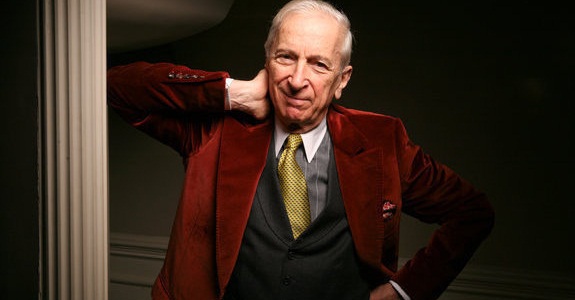Happy Birthday, Gay Talese, and Cheers to Your Intense Curiosity
By Cara Cannella

Gay Talese, 2009 © Fred R. Conrad for The New York Times
Imagine, if you will, that this evening, on the occasion of Gay Talese’s eighty-second birthday, we are throwing a dinner party in his honor.
We’ll all look like hell compared to him, of course, even dressed in our Sunday best. He’ll show up, as he does everywhere, in a bespoke suit "made by a tailor in Paris, whose father trained his father," complete with a "vest, pocket square, colored shirt with a white collar, cuff links," as described by Katie Roiphe in the introduction to her must-read Paris Review interview. In it, he explains, "I dress up for the story, ceremoniously. Because I think the story is really important."
You and I will trudge through New York City slush, dodging splatter by passing trucks as we make our way to the invitation destination, red-faced and shivering. Talese will arrive composed, with nary a snowflake on his fedora.
Since the Upper East Side institution of Elaine’s -- where Talese was among the regular crowd of eating, drinking, and schmoozing writers, editors, and actors -- closed in 2011, we've chosen a far-flung outer borough hole-in-the-wall joint with great food, zero ambience, and enough anonymity to keep it interesting. For these purposes, it doesn’t even need a name.
Talese is nothing if not curious ("All I have is intense curiosity. I have a great deal of interest in other people and, just as importantly, I have the patience to be around them," he told Roiphe), and we'll do whatever possible to ensure he enters his eighty-third year exactly where he likes to be: compelled by the unknown, on the brink of discovery.
The guest list is an eclectic mix of sources and forces influential in shaping Talese’s work and life. He might be a stickler for the facts, but he’s also imaginative, so we imagine he has blessed our suspension of disbelief in gathering this cast of characters, dead and alive, for the sake of celebrating his life and career as one of the most influential nonfiction writers in history.
Although he dismisses the notion of founding what’s often referred to as New Journalism -- a style in which techniques of fiction are applied to crafting true stories for magazines and newspapers -- there’s no denying that, beginning with his work as a New York Times reporter in the 1950s, his writing has had a cohesive magnetism characteristic of the best short stories, like those by his hero and main influence, F. Scott Fitzgerald.
Talese is perhaps best known for his brilliantly titled 1966 Esquire magazine profile, “Frank Sinatra Has a Cold" (later selected by the magazine as its best story ever), for which he did not speak directly with Sinatra at all. Kept at bay by the crooner’s gaggle of handlers -- including a publicist, a valet, and the person in charge of his toupees -- the ever-industrious and resourceful Talese spoke to nearly everyone in Sinatra’s orbit. In doing so, he composed an unforgettable portrait of the man as viewed through the prism of those who knew him best, including his mother in New Jersey, who dished with Talese about her son’s relationship with Ava Gardner.
Okay, back to the dinner party. No big deal that we've meandered a bit. If anyone accepts that “digression is the sunshine of narrative,” to paraphrase Laurence Sterne’s Tristan Shandy, it’s our man Talese, whose most recent book, A Writer’s Life, follows his own life as interwoven with that of a female Chinese soccer player named Liu Ying, a closeted gay manager of an Upper East Side club who died of AIDS, a former headwaiter at Elaine's, Tina Brown as editor of The New Yorker, and a post penis-chopping John Bobbitt.
They are all at the dinner party, along with the tuba player who pulled up the rear of the New York City Saint Patrick’s Day Parade, only to be profiled in one of Talese’s first stories for the Times. There’s also the masseuse with whom he spent countless hours amid deep (some say too deep) research for Thy Neighbor's Wife, his book about American sexual liberation in the 1970s.
There's also the murderous Bill Bonanno, a member of the Mafia family that makes up Talese's Honor Thy Father (whose children Talese put through college with proceeds from sales of the book), along with Sinatra's mom, Talese's mom -- Catherine DePaolo Talese, a Brooklyn native who owned the Ocean City, New Jersey dress shop where Talese first learned to eavesdrop -- and his dad, Joseph Talese, a southern Italian tailor who came to America in 1922 and inspired his son with stitch-by-stitch attention to quality and detail.
And there’s Talese's wife Nan, of course, a book editor at Doubleday with her own imprint, who has sat patiently with her husband's research assistants as they tape-record hours and hours of interviews with her for his next book, a chronicle of their more than fifty-year marriage.
If you're lucky enough to sit beside Talese during the birthday dinner's game of musical chairs, expect that he will engage you in conversation, and you will reveal yourself in ways you never thought possible, saying things so true they're new even to you. All because he knows how to perceive you, as he does the world, and how to ask the right questions.
